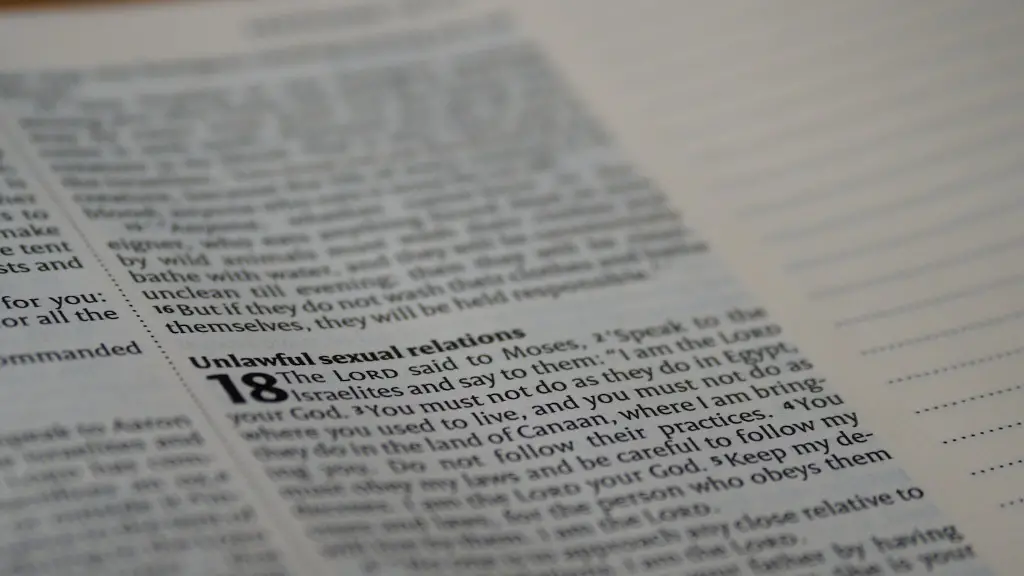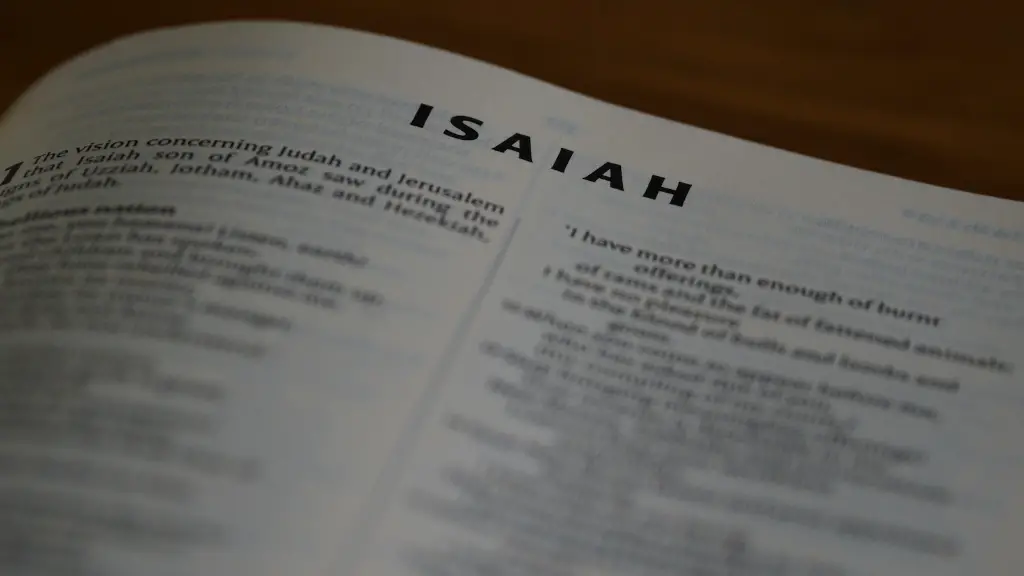When one thinks about curses, religious texts are some of the first sources of knowledge to consider, especially when it comes to the Christian faith. The Bible has a lot to say about curses, from a variety of passages. To understand them and what the Bible says about curses, one must take into account the context from which these passages come.
The Bible has a history of divine curses. One of the earliest and most famous curses in the Bible is the curse God places upon Adam and Eve. As described in Genesis, immediately after eating the forbidden fruit, God cursed the ground, introducing suffering and death, and other consequences.
Cursing someone or something is serious business in the Bible. In Leviticus, there are several commands regarding not cursing people and to treat each other kindly. In Exodus, there are specific commands against not cursing leaders, fathers or mothers. The Bible gives clear instructions that we should not curse our leaders nor those we come into contact with, even if they do us wrong.
The Bible warns against the power of the tongue. Words have a great power to hurt and therefore cursing someone, whether you mean it or not, can be incredibly damaging. Proverbs says “whoever keeps his mouth and his tongue keeps himself out of trouble”. The Bible does not however simply prohibit cursing as if it were an absolute thing; it warns of the consequences of cursing. Each of us should examine our relationship with our words and be aware of the potential of curses that come out of our mouth.
Not all curses made in the Bible are aimed at people. Some of the curses presented have the purpose of teaching us lessons or to warn us of what happens when we stray from God or disobey him. These teachings are meant to inform us how to live in accordance with God’s laws and how to follow Jesus. The Bible has much to say about cursing to emphasize the importance of using our words wisely. It is clear that our words have the power to hurt and we should be mindful of that power.
The Consequences of Cursing
Throughout the Bible, you can find numerous warnings against cursing and the consequences of doing so. Cursing is seen as a sin in the Bible, and as with all sins, there are moral, spiritual and physical consequences. It is important to note that the consequences of wrong behaviors, especially cursing, extend far beyond our own lives and can bring consequences to our society as a whole. This can be seen in passages such as Galatians 6:7-8, in which Paul states that we will reap what we sow. This reiterates the idea that our actions have a ripple effect and cause a chain reaction that can affect our fellow humans and the world around us.
When the Bible speaks of punishment for cursing, it typically connects it with a vow or an oath, indicating that it should be taken very seriously. This leads us to ask ourselves why these vows are so solemn and how important they are. Jesus himself warned his disciples in Matthew 5:37 to “Let your ‘Yes’ be yes, and your ‘No’ be no,” implying that making promises or cursing should be taken seriously. We can take this warning to heart by being aware of how the words we each speak can have lasting consequences.
Finally, the Bible also serves to remind us that all of our words, both curses and blessings, have an effect on those who hear them. Our words, even when spoken unintentionally, can have an emotional and mental impact on those around us, especially those we are in closest proximity to, such as family and friends. It is important to examine our thoughts and words and replace any negative, damaging or destructive language with kindness and love.
Blessings in the Bible
The Bible does not only emphasize the consequences of cursing, but also emphasizes the importance of blessings. This can be seen in many scriptures, such as Jeremiah 29:11, in which God promises to bring blessings to those who seek him. We also see this in Matthew 5:44, where Jesus encourages his disciples to bless their enemies and pray for those who persecute them. These two scriptures provide us with a great example of how to use our words in a way that honors both ourselves and those around us.
Blessings in the Bible can also come from God, but also from people as well. Jacob and Esau’s blessing of each other in Genesis 27 is a great example of this. This is a reminder that blessings do not only come from God, but also emanate from the kind words of others. It is important to look for blessing opportunities in our daily lives and use them as a form of encouragement, connecting with and building up one another in the spirit of love.
Blessings are a form of connection and recognition of our shared humanity as children of God. It is through blessings that we recognize our kinship with one another and are reminded of how each of us is significant, worthy and valuable. Blessing others is an act of kindness and humility, and it is a purposeful use of our words to bring light and love into our relationships.
The Power of Prayer
When thinking about curses and blessings, we must also consider prayer. Prayer is a powerful tool to turn to, not only to ask for forgiveness for all kinds of wrongs, including cursing, but also to offer blessings. It is through prayer that we can call upon God for strength and for healing for ourselves and for those around us.
Prayer is so often overlooked as a powerful form of communication. It is a way of communicating with a higher power, with a force that is not of our own, and it requires us to show humility and reverence. Praying to God is a way of honoring both ourselves and those around us, and it grants us access to God’s love and guidance.
As Christians, prayer is a powerful way to seek guidance and discernment in life. It can break down barriers, soften hearts and bring peace to our lives. When used in the right way, prayer can be a tool to break curses, bring healing and restore peace to us and to those around us.
Curse Breaking Prayers
Breaking curses through prayer is a common practice in many traditions, including Christianity. It is a way to address the wrongs of the past and to offer up a solution for moving forward. Curse breaking prayers can range from short meditations to elaborate rituals and ceremonies, often invoking the power of God.
When praying to break a curse, it is important to address the destructive pattern that has been created. We must be aware that curses, even those invoked unintentionally, can cause damage and harm to our own lives and to the lives of those around us. By praying for curse breaking we can open the door to understanding why the curse was put upon us and redirect our focus on God’s healing love.
Curse breaking prayers can also serve as a reminder of the power of our words. Praying to break curses will help us recognize how what we say can destroy and how it can, as Jesus taught us, also be used to bless. By engaging in prayerful curses breaking, we close what had been opened and we put down our weapons of words and instead offer up peace and forgiveness.
Breaking Curses through Repentance
When examining curses, one must also consider repentance. Repentance is a central theme in the Bible and is a powerful tool in breaking curses. It is an acknowledgement of the wrongs and a chance to make a change. Repentance is an act of humility, of being honest about our mistakes and owning up to them. It is an act of forgiving ourselves, which is often the hardest step in the process of repentance.
Repentance is a powerful way to start breaking curses and to set ourselves free from its effects. It reminds us that no matter our mistakes, God will forgive us and that we are always worthy of his grace. Through repentance, we can find healing and restoration and we can set ourselves on the path to renewal and growth.
It is important to remember that the Bible serves as both a source of warning and of encouragement. It teaches us to use our words wisely, to use them to bless, not to curse, and to be mindful of the power of prayer. As well, it emphasizes the importance of repentance and of turning towards God in order to break curses and experience growth and healing.





